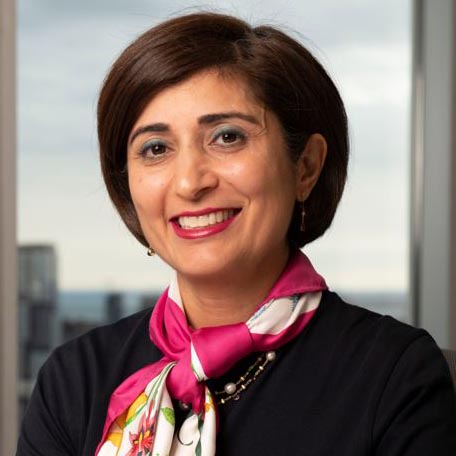OsgoodePD’s Professional LLM in Dispute Resolution is a graduate program designed specifically for working professionals. Each of our distinct specializations focuses on interdisciplinary learning and provides you with a unique mix of academic, applied, and theoretical perspectives. You will learn through interactive discussions and explore practical issues related to your specialization. You’ll have access to a wide range of elective options to broaden your legal knowledge or explore new areas related to your professional interests.
The Dispute Resolution specialization offers an in-depth examination into existing limitations of traditional conflict resolution processes and new approaches to resolving disputes. Required courses address the theory and practice behind dispute resolution. You will explore ways to function more effectively when resolving conflict as a representative or a neutral, and work to improve your analysis, problem-solving, and negotiation skills.
Who is the Specialization for?
Lawyers or law graduates with legal work experience who have a strong demonstrated interest in dispute resolution and wish to establish or expand a practice in this area of specialization
Senior non-legal professionals who have significant experience in helping third parties or members of their own organization resolve conflict and disputes.
Alumni Spotlights

Sandhya Kohli
Sandhya works as a mediator and conflicts consultant. Sandhya was looking to learn more about the various methods of conflict resolution , which led her to the Professional LLM in Dispute Resolution.

Nathan Roth
Nathan is a doctor and Region Lead at Cancer Care Ontario. He shares his experience as the lone doctor in his cohort for Osgoode’s Professional LLM in Dispute Resolution program and why the program was the perfect way to round out his education and build on his existing body of work tackling complex relationship management issues in his various roles and daily interactions.
Student Services
All Professional LLM students can benefit from our wide range of student services:
Academic Services
Program Orientation
Introductory Courses
Workshops & Resources
Confidential Academic and Wellness Counselling
Career Support
Job Postings
Resources/Guides
Workshops & Events
Counselling
Campus Life
Student Social Activities
Osgoode & York U Extra Curriculars
Professional Networking Events
All of our academic and career development services are available remotely, and counselling hours have varied schedules to suit the needs of part-time students.
Information Session
Interested in our part-time Professional LLM in Dispute Resolution? In this on demand session, you will learn more about course offerings, degree requirements, what to expect during your studies and the steps to apply.
Course Requirements
The Professional LLM in Dispute Resolution requires completion of 36 credits including a research requirement. The program is designed to be completed in two years (six active terms) through a combination of required courses, related electives and up to 6 credits of outside electives.
What You Can Expect
The program is designed to be completed in two years (six active terms) by completing 6 credits (one or two courses) per term.
All courses in the Dispute Resolution program are designed as intensives. Intensive courses typically run over four/five consecutive days (9AM-5PM) or over two weekends (Thursday evening + Friday & Saturday 9AM-5PM). The second required course in the program, Theory and Practice of Dispute Resolution requires in-person attendance. Some elective courses require in-person attendance and others can be completed through live video conference. Provided that you select only elective courses with a video conference option, you could complete your electives entirely though video conference.
In your first term of admission, you may be assigned a course as a condition of your admission. Admission condition courses count towards your degree requirements. Students with the following profiles usually have required introductory courses:
- Internationally-trained lawyers: GNRL 6209 – Canadian Graduate Legal Research & Writing (Online) (3 Credits)
- Professionals without a law degree: GNRL 6149 Introduction to Graduate Legal Studies (3 Credits)
Required Courses
Required courses are offered once per year. You must complete the required courses before moving on to elective courses within the specialization.
ALDR 6300 – Introduction to Dispute Resolution (6 Credits) – Fall term
ALDR 6301 – The Theory and Practice of Dispute Resolution (6 Credits) – Winter term
(This course requires in-person attendance)
Elective Courses
Elective course offerings vary from term to term. Some options include Culture, Diversity, and Power in Dispute Resolution, Dispute Analysis and Process Design, and Mediation Advocacy. To see course offerings for upcoming terms, review the Course Planning information below.
You must complete at least 30 credits in total from Dispute Resolution courses. Up to 6 credits may be drawn from courses in unrelated specializations, so long as you have any required prerequisite knowledge for those courses.
A sufficient number of elective courses in the program are offered online (through live interactive video conferencing), such that students could complete all of their elective courses online. Students who wish to complete all courses online may need to be prepared to take one or more leaves of absence during the program, dependent on elective availability and scheduling.
Research Requirement
The research requirement can be fulfilled through one of the following three options. Most students elect to fulfill the requirement through option 3:
- A Major Research Paper (70 pages, 6 Credits)
- An Independent Significant Research Paper (30 pages, 3 Credits)
- A Significant Research Paper (30 pages) completed as the means of assessment for one of the courses within the specialization.
Course Planning
Course plans are typically provided for the next two calendar years. Specific course schedules are subject to change without notice until the course enrollment process for an upcoming term begins. Please check course schedules immediately before making your enrollment request to ensure you have the most current schedule information.
This tool is for planning purposes only. Selecting courses using this tool does not enroll you in the course or reserve a space in the course for you.
Course Offerings
The Professional LLM in Dispute Resolution Law requires completion of 36 credits including a research requirement. The program is designed to be completed in two years (six active terms) through a combination of required courses, related electives, and up to 6 credits of outside electives.
Required Courses
Elective Courses Include
Application Dates
The Dispute Resolution specialization accepts new students once each calendar year, in the Fall term.
Fall 2026
Applications Not Currently Open
Applications will open on October 01, 2025
Faculty
Program director
Martha Simmons
Instructors include
Marc Emond
Linda Ippolito
S. Ronald Stevenson
Tuition and Fees
Part-time students pay in six installments over six active terms.
You will be billed an installment for each term in which you enroll in courses. If you complete the program in fewer than six terms, you’ll be billed your remaining installment(s) at the end of your program. If you need more than six terms to complete your credits, extra term fees will apply.
Please note that the tuition/fees displayed here are subject to change, and may vary depending on your entry term.
Domestic (Ontario)
$3,800.79per term for 6 terms
$22,804.74total
Domestic (Out of Province)
$3,990.83per term for 6 terms
$23,944.98total
International
$8,828.66per term for 6 terms
$52,971.96total
Students are also subject to supplementary fees including health benefits. Find out more about supplementary fees here.
Admission Requirements
Admission to Professional LLM specializations is competitive. At OsgoodePD, we can help you navigate the process. The Admissions Committee reviews each applicant’s completed file and takes into consideration criteria such as academic background, professional work experience, and whether the program fits your stated goals. The information below represents the minimum requirements for admission consideration to our graduate degree programs – meeting these criteria does not guarantee admission.
JD/LLB degree or undergraduate degree (a graduate degree is an asset to non-legal professionals)
Overall B (75%) average (or equivalent)
Professional work experience (JD/LLB graduates require at least 2 years, while non-legal professionals require at least 5 years of related senior-level experience)
Acceptable English language proficiency (see requirements)
How to Apply
Create Your OsgoodePD Applicant Profile
Create an applicant profile in our online application portal. This portal allows us to gather your information, transcripts, and other documents electronically. You will receive an email with directions outlining how to create a new password for your application, along with a link to access the application.
Upload Application Documents
The following documents are required:
- Resume/CV
- Writing Sample
- Contact Information for Two References
- Transcripts
- Official Proof of Language Proficiency (if applicable)
For more information, see our Application Documents to Upload section.
Pay and Submit
Once your application is completed, you will be required to pay a non-refundable $140 CAD application fee.
Wait for Review
Timelines for decisions vary by program, but we will be in touch if we have questions about your application or need more information.
Frequently Asked Questions
Contact Us
Have questions? We’re here to help! Click here to get in touch.

